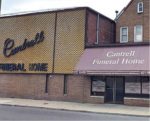
Once heralded among the cadre of funeral homes for Blacks in Detroit, Cantrell Funeral Home was a mainstay on the city’s east side.
Established in 1968, after the race riots, the now beleaguered establishment, and household name, is thwarted by yet another scandal. Despite being closed in April, after investigators cited a plethora of violations to state rules, such as bodies with mold and improper storage of remains, new findings of impropriety has arisen.
While the building, located on 10400 Mack Avenue was recently purchased with reports of becoming a community center, evidence of the funeral home’s unfinished business languish. On Friday, October 12,2018 the remains of eleven badly decomposed infant bodies hidden in the ceiling were discovered after an anonymous letter was sent to state investigators. The use of cadaver-trained police dogs was used by the Michigan State Police to further search the facility, but no additional bodies were found.
As a funeral home that had a footprint in the city’s legacy of generational black family businesses in mortuary science, today, that legacy is overshadowed by a gruesome discovery that leaves the Cantrell band marred by egregious mishandlings of the dearly departed.
Though dealing with death is an experience that is faced by all people, the process is beset with nuances that are not often understood.
In Michigan, if a body is not buried or cremated within 48 hours, embalming is usually required for transportation. In addition, in instances where death was a result of certain communicable diseases, embalming is always required. With this process of burial, are additional costs to include caskets, which can be one of the single greatest expenses incurred, and paperwork such as permits and dead certificates that prolong the process. Escalating funeral service fees such as ceremonies and caskets can be exorbitant for working and poor families who fail to plan ahead for death, absent of an insurance policy, just as nonpayment to both funeral homes and cemeteries are further impediments.
For this reason, it is difficult to understand fully the many reasons that bodies pile up in funeral homes and the Detroit morgue, but one identifiable answer is the poor can’t afford burial.
Just as Detroit’s morgue has struggled with unclaimed bodies that government struggles to pay for burials, the same exists for families who are financially strained. Despite the small amount available through grant applications at Michigan Department of Human Services, the nominal amount proves no match to the high price the living pays for the dead.
In a city that still has high levels of poverty, the overarching moral dilemma of CantrellFuneral Home does not go without shame for a lack of care for families and the deceased bodies it was entrusted with. Nevertheless, the recent discoveries made within the funeral home and its state violations over the course of this year, speaks to an even larger problem that exposes the human condition with a macro dilemma in need of a solution.
With death as the only guarantee in life, we must determine new ways to ensure regulation of proper burials by equipping families with information and resources to hold funeral proprietors accountable, in addition to making the process affordable.